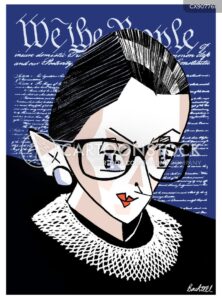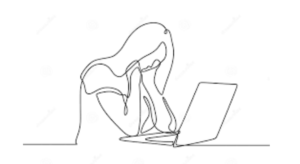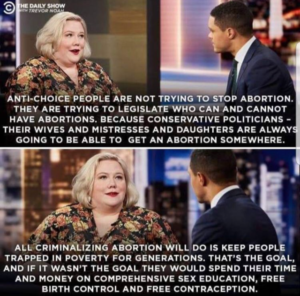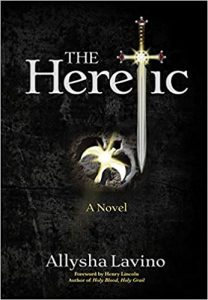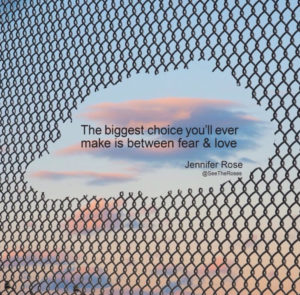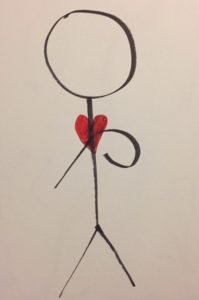Choice
Private Morality
December 9, 2021“Another world is not only possible she is on her way. On a quiet day, I can hear her breathing.” -Arundhati Roy
Justice Ginsburg: “For one thing, we should appreciate the women on whose shoulders we stand, women who said the same things we said many years later, but we spoke at a time when society was willing to listen.”
Write to them. Share your story.
Supreme Court
1 First Street
NE Washington DC 20543
‘Abortion is not just about “a woman and her body.” It’s also about a woman and her God, her sense of what is right and wrong, a woman and her own internal compass, a woman and her life and how she is called to live it. When I heard a young woman on a panel describe an abortion as no bigger deal than a pap smear, I remember two things: 1) feeling nauseated, and 2) thinking, “This has gotten insane. We’re going to lose this.”
I am thoroughly pro-choice, but not because I don’t believe abortion is a moral issue. I’m pro-choice because I believe it’s an issue of private morality…’
A deeply reflective and personal essay about the right and devastation of ending a pregnancy, a woman’s decision and her private morality…her choice. ~dayle
Abortion In a New Light.
The Answer with a capital A.
by Marianne Williamson
“With the Mississippi abortion case now before the Supreme Court, it appears that reproductive rights in this country could very likely be severely curtailed.
I was a child when the Roe V. Wade decision legalized abortion in the United States. Becoming sexually active years later, I never knew a time when a woman couldn’t assume her right to an abortion should she choose to have one. My late teens and twenties were a time of tremendous feminist tumult – often referred to as “a war between the sexes” – and a woman’s right to control her reproductive destiny was a huge part of our newly forged freedom.
I can’t remember a sense of huge controversy around Roe v. Wade in the years first following the decision. It was only later that the topic became a roiling argument throughout the country, more and more people expressing passionate positions either pro or con. Generations of women grew up taking the right to an abortion for granted, with seemingly little understanding of how fragile a right can be when its disappearance is only one Supreme Court decision away. I’ve often been astonished by women who didn’t seem to realize the significance of their political choices in regard to this fundamental freedom. No matter how many times you’d remind someone during presidential campaign season, “But the Supreme Court! The Supreme Court!” there were always those – including young women who I assumed were sexually active – who’d roll their eyes as though it simply didn’t matter. Never having known a time when the choice wasn’t theirs, they seemingly couldn’t imagine a time when it wouldn’t be.
What is happening now, then, has been brewing for years. And strident voices on both sides of the argument made it inevitable. While I’ve always been committed to a woman’s right to choose, I’ve been disturbed over the years by how the issue has been contextualized on the political left. I saw it as problematical both morally and politically.
I was always told growing up that it’s not government’s role to legislate morality. There were issues of public morality and those of private morality; while ethical decisions should weigh heavily in public policy, “government should stay out of people’s bedroom,” as my father used to say. While as citizens we should care deeply about the moral dimension of political decisions, when it comes to an individual’s private choices – choice that had no one effect on “the common good” – then government should have no say whatsoever. I have never deviated from that belief.
I’ve always recognized a moral dimension to the issue of abortion, but to me it’s an issue of personal morality. Denying a woman the right to her own moral choices, as well as the choice of what she will do with her body, is government overreach and transgression upon her freedom, period. But a casual abortion is as much a moral anathema to me as it is to any rightwing conservative. And the vast majority of women I’ve known – including those who have had abortions – feel the same. Whether or not to terminate a pregnancy is a deeply painful decision, and one made by most women because of ethical considerations: the failure to be able to financially support a child, her relationship to the father, health considerations and so forth. It’s hard enough deciding whether or not to terminate a pregnancy; the last thing a woman needs is to have the government weighing in on her decision.
Yet any suggestion that abortion is a moral issue has been considered by many in the pro-choice movement to be a slippery slope that would lead to disastrous political results. I very much disagree, however; I think our failure to recognize its moral dimension is part of what has led to disaster. Our failure to put the issue of abortion within a moral context been a gift to the anti-choice movement.
Over the years, an overly secularized left became stridently amoral on the issue of abortion. This made me squirm, not only because I felt it was wrong but because I could see that it aroused a deep reaction in those whose social and political leanings were more conservative than mine. Over the years we began to lose the social consensus that abortion should be legal, in part because of those who kept continually trying to argue that in essence it’s no big deal.
But it is a big deal. Abortion is not just about “a woman and her body.” It’s also about a woman and her God, her sense of what is right and wrong, a woman and her own internal compass, a woman and her life and how she is called to live it.
When I heard a young woman on a panel describe an abortion as no bigger deal than a pap smear, I remember two things: 1) feeling nauseated, and 2) thinking, “This has gotten insane. We’re going to lose this.”
I am thoroughly pro-choice, but not because I don’t believe abortion is a moral issue. I’m pro-choice because I believe it’s an issue of private morality, and I trust the moral decision-making of the American woman. It’s a deeply personal decision for a woman whether to terminate a pregnancy, and government should have no right to make that decision for her. An additional moral issue is that repealing Roe v. Wade will simply mean rich women can continue to have safe abortions (they always did), while poor women will be relegated to the days of back alley, dangerous abortion procedures. Economic injustice is itself a moral issue.
As a political candidate I was told on various occasions by people with an anti-choice orientation that they would vote for me despite my pro-choice positions and my support for Roe v. Wade. “But you do agree it’s a moral issue, right?” they would say to me. “I just need to know that you see that.” It was a very easy promise for me to make.
Abortion is one of several areas where the refusal of those on the left to include the moral dimension of an argument in its analysis, much less how it was to publicly communicated, has diminished the moral authority of progressivism as well as its deeper connection to the hearts of our fellow citizens. Treating people of faith as though their consideration of issues is too unsophisticated to be taken seriously has had a deeply deleterious effect on American politics: it already has – and will continue to, if left uncorrected – begun to shrink the political base of progressivism. It is a serious surrender of moral authority, and a surrender of moral authority almost inevitably leads to a surrender of political authority. It’s no accident that year after year, in poll after poll, we’ve watched support for reproductive rights fall. Yet no one was allowed to say, “Perhaps we could reconsider our approach to this.” Nope. Such conversation was suppressed almost fanatically by the self-proclaimed arbiters of exactly how we were permitted to talk about Roe v. Wade.
[Marianne Williamson]
In A Course in Miracles it refers to the Answer with a capital A. That answer is not about which one of us is right; in a free society, no one gets to have a monopoly on the truth. Our political as well as our spiritual salvation lies in learning to speak, to think, and to respond from a much deeper place. Stark binary choices provide little opportunity for truly creative problem-solving, much less a miracle. We will continue to crash into walls both political and personal until we deepen the level of consciousness from which we approach our lives. Yet when we do, our lives will transform. Our politics will transform. And our world will transform.
The war over reproductive rights is a symptom of a deeper problem, and until we address the underlying issue of how we speak to each other and listen to each other, respect each other and honor what our hearts are saying, we will remain divided in ever more dangerous ways.
____________________________________
[From The Daily Show with Trevor Noah.]
Free child care, free early prekindergarten, free conception, and education. No, as Marianne cringed and became nauseous hearing abortion is like pap smear. Horribly, no. There are layers, often complex layers a woman has to hold to make a deeply morality based decision. If SCOTUS eliminates viability, abortion will instantly be nullified in at least 20 states, making abortions illegal after six weeks, of course most women often don’t know they’re pregnant until a number of weeks later.
The Supreme Court will present their final arguments and a decision some time next summer, June 2022. If the conservative judges who were placed on the bench for the sole purpose of overturning Roe, they have their votes. Privileged women will continue to find abortion sites, perhaps in other states, yet those women in poverty won’t be able to drive long distances to find a clinic that will assist them; if they do assist, doctors may be arrested on criminal charges. It will fundamentally change the country where abortion has been legal for generations.
I urge you to write to the Supreme Court, all women…all ages. Tell your stories, explain to them your private morality, what could or did happen to you, be it going forward with having the baby, or ending the pregnancy and why you made that decision. What were the social services needed that you didn’t receive, i.e., contraception, education, medical care.
Here’s the address again:
Supreme Court
1 First Street
NE Washington DC 20543
From former CBS news anchor/journalist Dan Rather:
The issue of abortion is one on which fair minded people, honest to their own beliefs and moral codes, can disagree. But today was not about personal choice. It was about the law of the land that will make no exceptions other than those carved out by the states. And if the history of a time before legal abortions is any guide, and there is no reason to suspect otherwise, today will beget many personal tragedies, ruined lives, hardship, and despair. -Essay from Dec. 2, 2021, “Steady.”
What is the end game? Why subvert individual rights, dilute voting rights, gerrymandering, billionaire favor? Historian and Harvard professor Jill Lepore weighs in with her thoughts on her latest Pushkin/BBC Series about Elon Musk, episode #5 of “The Evening Rocket.”

“It’s a weird thing about being a historian, everything reminds you of something else. […] ‘Muskism’ asks us always to picture the future, but I find it hard not to keep picturing the past, yanked back, lassoed by likenesses. […] The people with the most money shouldn’t get to decide what happens on earth, or on the moon, or in the skies, or on mars, or any where. To me the largest story about the rise of ‘Muskism’, extravagant extreme fantastic capitalism, is its anachronism. I can’t tell you anything about the future of ‘Muskism,’ but it strikes me that for all its obsession with the future, ‘Muskism’ is trapped in the past. Elon Musk is a visionary, but what I’ve come to believe doing the research for the series is that those visions come from a future first imagined in science fiction long, long ago. Decades, sometimes more than a century ago, rockets to Mars, electric cars, cyptocurrency, a future without governments or banks, a future where engineers and scientists, and only engineers and scientists, have the answers. A future whose long dead authors very often pictured a world where the poor and powerless and the robots know their place, and it is
to serve the powerful quietly and obediently and without daring to claim sovereignty, or independence, or even intelligence.
This future was imagined by a very tiny number of men during an age of imperialism, before women could vote, an age of staggering economic inequality and brutal racial injustice, in an age of pandemic disease, unraveling democracies, and world war.
The present is tough, but that past is passed, and I don’t ever want it to be the future again.”
‘…the precious gift of choice.’
June 19, 2020Richard Rohr, Center for Action and Contemplation:
Rev. angel Kyodo williams seeks to liberate both the oppressed and the oppressors, which is appropriate as we celebrate Juneteenth in the United States today, to recognize the final day of emancipation from slavery in our nation. In this passage she shares her path to becoming an agent of transformative, peaceful social change.
Rev. williams:
“My formal Zen practice and training were teaching me to find a more restful place that I could abide in within myself despite the chaos and calamity [of] living in an unjust society. . . . It also gave me a way to be in response to sometimes overwhelming situations that could just lead me to a downward spiral of anger and negativity. . . .
The Zen community I eventually became engaged with [the Zen Peacemaker Order] . . . [was] explicitly committed to social action.
I advocated for [a] more balanced approach to fiercely address injustice from a place of empowerment as a warrior—but one that was ultimately committed to peace rather than aggression. This path recognized the clarity and resilience brought about by cultivating one’s inner life. . . . I saw this as a more sustainable path, especially for Black people, whose road to victory in the external landscape would likely be a long one given the deep entrenchment of the forces of oppression set against us.
In response to the events of September 11th, I wrote what became known as the Warrior-Spirit Prayer of Awakening…
May all beings be granted with the strength, determination and wisdom to extinguish anger and reject violence as a way.
May all suffering cease and may I seek, find, and fully realize the love and compassion that already lives within me and allow them to inspire and permeate my every action.
May I exercise the precious gift of choice and the power to change [as] that which makes me uniquely human and is the only true path to liberation.
May I swiftly reach complete, effortless freedom so that my fearless, unhindered action be of benefit to all.”
May I lead the life of a warrior.
[1] Rev. angel Kyodo williams, Lama Rod Owens with Jasmine Syedullah, PhD, Radical Dharma: Talking Race, Love, and Liberation (North Atlantic Books: 2016), 90–94.
Allysha Lavino
April 10, 2020‘The journey to becoming the hero of your own story isn’t easy … but it is a well-marked path.
There are certain signposts, trials, and tribulations every hero must undergo in the process of becoming. While Your Path will certainly be your own, there is a crucial first step to embarking on any quest.
ASK TO BE SHOWN THE WAY.
This might look like a prayer, a wish, a hope, a whisper, a willingness, a plea … It is a conscious pulling on one of the strings of the quantum web, so that the music of the Quest may begin.
“…it’s all part of the process. The Initiate has to set out on the quest without knowin’ where she’s goin’. It’s in all the stories … Along the way, there are clues and tests. The Initiate has to gain new awareness and use all her skills to survive and complete the quest.” ~THE HERETIC
The key to questing is that you don’t know where you’re going. It is all ways a journey into the UNKNOWN. That is how I know that we’re all on a Quest right now.
I may not know what the terrain ahead looks like, but I do have some experience with the process. No matter where we go, or what we may become, the spirit of the Quest is the same.
The possibility of initiation is being offered to each of us.
Will you ask to be shown the way?
It will take courage. You’ll have to choose in every moment. And you do not get to know the way. It is a step of trust … of courage … into the Unknown.
It may not be for the faint of heart …
But some of you are ready.
I can feel it.’
♥
Be brave.
May 18, 2018Seth Godin
October 24, 2017All is love.
February 18, 2017Truth is of the people
By the people
For the people.
︶⁀°• •° ⁀︶
I believe that we are waking up from the spell
That those that profit from the fear
Cast so well
And good people of the earth now can tell
There is no us and them
If not now, when
If not today then
What happens tomorrow
All is love
All is choice
Everyone and every voice
All of life that you see
All are possibilities
As above so below
To wed the sense into the soul
This is truth
I believe
I believe
I believe
-Melissa Etheridge
Seth.
March 20, 2016‘That’s an easy mistake to make and a tempting trap to fall into.
It’s unlikely you have no choice. More likely: There’s no easy choice. No safe choice that also embraces your potential. No choice you can make that doesn’t cause short-term misery in exchange for a long-term benefit.
When we say we have no choice, we feel trapped and we are powerless. That’s no way to do our work every day.
Do it or don’t do it. It’s up to you.’
-Seth Godin
Are you interesting?
October 30, 2015Seth Godin.
‘More interesting than you realize.
An interesting person is interesting to us because she combines two things: Truth and surprise.
The truth: Not necessarily a law of physics, not necessarily a measurable truth in nature, but merely the truth of experience. “I believe this,” or “I see that.”
And surprise. Note that surprise is always local. Surprising to me, the audience. That’s one reason that it’s said that interesting people are interested—they are empathetic enough to realize about what might be surprising to the person in the room, and they care enough to deliver on that insight.
Everyone is capable of telling the truth. And everyone has been surprising at least once.
Which means that being an interesting person is a choice. We can choose to show up, to care enough to contribute our humanity to the next interaction.
It’s a choice, but a difficult one, because being interesting feels risky. People are afraid to be interesting, not unable to be interesting.
You’re not born uninteresting. But it’s entirely possible you’ve persuaded yourself to be so frightened of the consequences that you no longer have the passion, the generosity or the guts to be interesting any longer.
Without a doubt, we need your interesting.’
